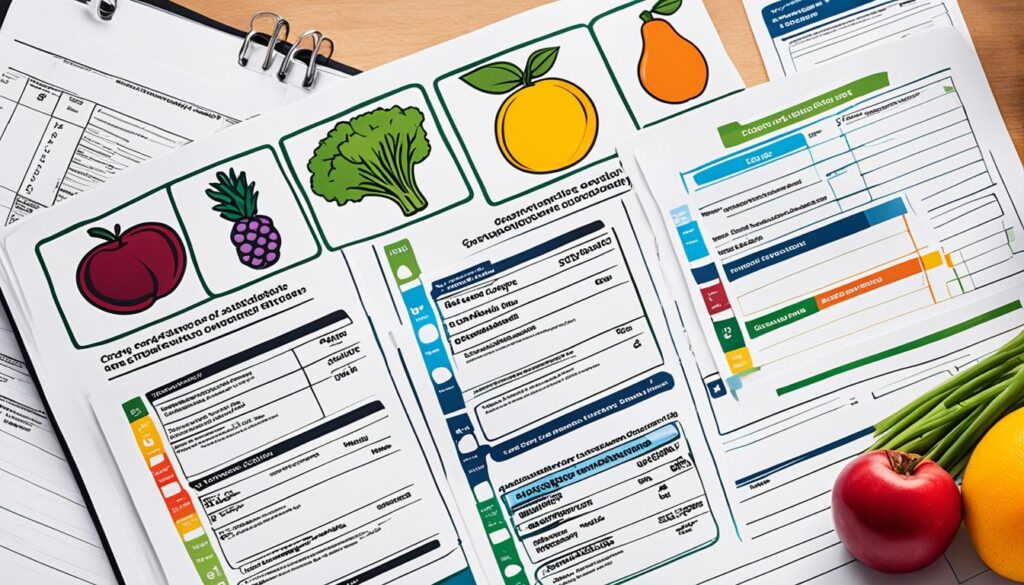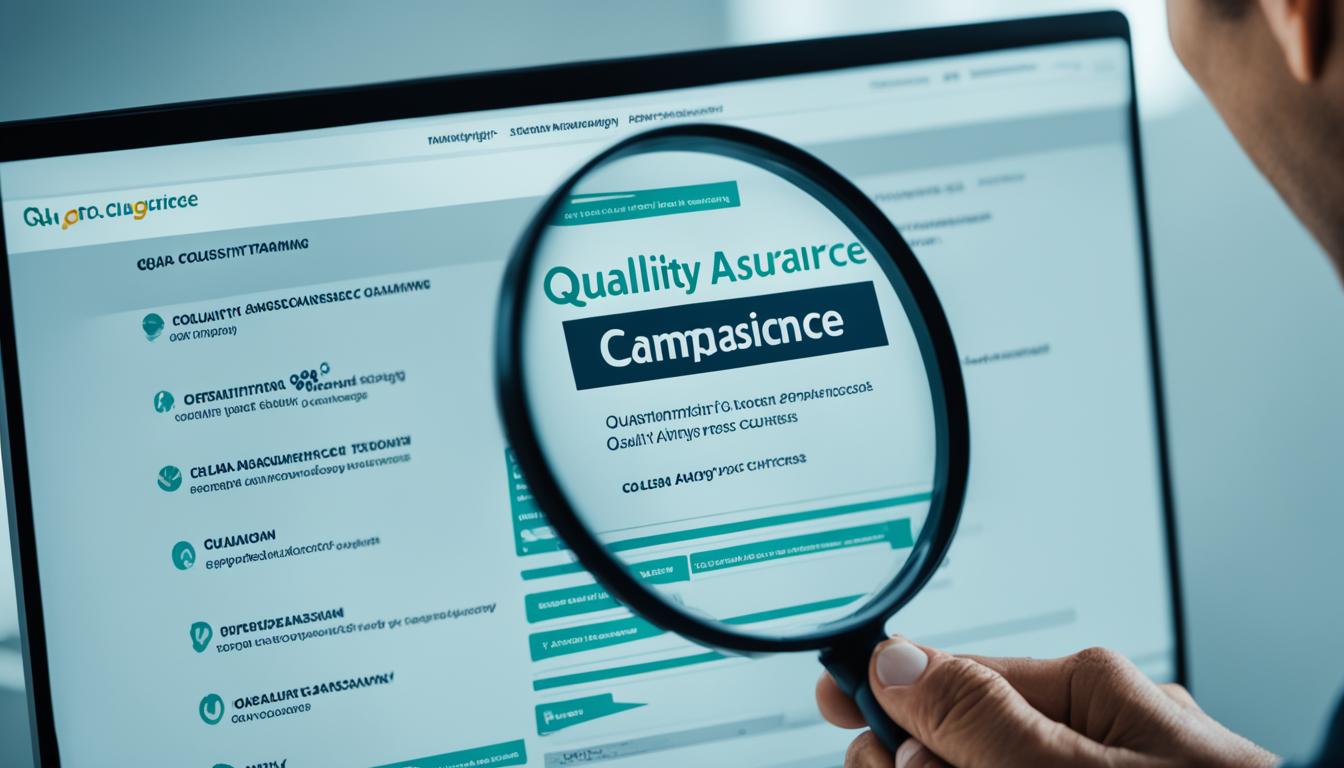Quality assurance training programs are essential for individuals working in the software testing industry. These programs provide professionals with the necessary knowledge and skills to maintain high-quality standards for products and services. Whether you are new to testing or a seasoned pro, there are plenty of online courses available to enhance your quality assurance abilities. Topics range from software testing to quality assurance certifications, industry-specific training, practical learning opportunities, and advanced quality assurance techniques.
Key Takeaways:
- Quality assurance training courses play a vital role in the software testing industry.
- Online training courses offer flexibility and convenience for learners.
- Topics covered in these courses include software testing, QA certification, and advanced QA techniques.
- Hands-on practical training is available to enhance practical skills.
- Industry-specific QA training caters to specific sectors, such as food safety management.
Browse Quality Assurance Courses
When looking for quality assurance training courses, it’s important to browse through a variety of options to find the best fit. These courses cover a wide range of skills, including software testing, Java programming, mobile development, web development, data analysis, Agile software development, leadership and management, and project management. By exploring different courses, you can choose the ones that align with your career goals and interests.
If you’re interested in software testing, there are courses available that focus specifically on this area. These courses will teach you the essential techniques and methodologies used in quality assurance for software products. You’ll learn how to conduct effective testing, identify bugs and issues, and ensure the overall quality of software applications.
For those interested in Java programming, there are quality assurance courses that specialize in this programming language. These courses will teach you how to write efficient and bug-free code, conduct thorough testing, and ensure the quality of your Java applications.
If mobile development is your area of interest, there are quality assurance courses that specifically cater to mobile app testing and development. These courses will teach you how to test and debug mobile applications on different platforms and devices, ensuring a seamless user experience.
For individuals focused on web development, there are quality assurance courses that cover various aspects of web development, such as front-end and back-end testing. These courses will teach you how to identify and fix issues related to user interfaces, functionality, and performance.
If you’re interested in data analysis, there are quality assurance courses that provide training on how to ensure the accuracy and reliability of data. These courses will teach you how to perform thorough data quality checks, validate data integrity, and implement solutions to improve data quality.
For those engaged in Agile software development, there are quality assurance courses that focus specifically on this methodology. These courses will teach you how to integrate quality assurance practices into Agile development cycles, ensuring the delivery of high-quality software at a rapid pace.
Leadership and management skills are also a crucial part of quality assurance. There are courses available that provide training on effective leadership and management strategies in the context of quality assurance. These courses will teach you how to lead and motivate teams, ensure quality standards are met, and manage projects effectively.
Lastly, project management is an essential skill for quality assurance professionals. There are courses that focus on project management in the context of quality assurance, teaching you how to plan, execute, and monitor quality assurance projects, ensuring timely delivery and overall project success.
“When browsing quality assurance courses, it’s important to find the ones that align with your career goals and interests. Be sure to explore options that cover a wide range of skills, including software testing, Java programming, mobile development, web development, data analysis, Agile software development, leadership and management, and project management.”
Recommended Quality Assurance Courses
| Course | Skills Covered |
|---|---|
| Software Testing Fundamentals | Software testing, bug identification, quality assurance methodologies |
| Java Programming for Quality Assurance | Java programming, code quality, testing in Java applications |
| Mobile App Testing and Development | Mobile app testing, debugging, cross-platform compatibility |
| Web Development Quality Assurance | Front-end and back-end testing, user interface testing, performance testing |
| Data Analysis for Quality Assurance | Data quality checks, data validation, data integrity |
| Agile Quality Assurance | Integration of quality assurance practices in Agile development, rapid software delivery |
| Leadership and Management in Quality Assurance | Team leadership, motivation, project management |
| Project Management for Quality Assurance | Project planning, execution, monitoring, quality assurance project management |
By enrolling in quality assurance courses that cover the skills and topics mentioned above, you can enhance your knowledge and expertise in quality assurance. Whether you’re a beginner looking to enter the field or an experienced professional aiming to advance your career, these courses will provide you with the necessary training to succeed.
Food Safety & Document Control
The Food Safety & Document Control course is a comprehensive quality assurance training program tailored specifically for professionals working in the food industry. This course focuses on equipping workers with the necessary knowledge and skills to ensure food safety management, implement effective document control practices, and comply with food quality control standards. Whether you are a part of a small or large food corporation, this course provides valuable insights into maintaining high-quality standards and ensuring compliance with industry regulations.
Through this course, participants will gain a deep understanding of the critical aspects of food safety management and document control. They will learn how to develop and implement robust food safety management systems, conduct effective risk assessments, and establish preventive measures to mitigate potential hazards. Additionally, the course delves into the importance of document control, emphasizing the significance of accurate record-keeping, version control, and document retention.
With the rise in consumer awareness about food quality and safety, it has become imperative for food corporations to prioritize these aspects in their operations. By completing the Food Safety & Document Control course, professionals working in the food industry can demonstrate their commitment to maintaining high-quality standards and provide assurance to consumers that their products are safe and compliant.
Key topics covered in the Food Safety & Document Control course include:
- Food safety management principles
- Hazard analysis and critical control points (HACCP)
- Good Manufacturing Practices (GMP)
- Document control procedures
- Food quality control standards and regulations
- Internal and external audits
- Corrective and preventive actions
By participating in this course, professionals can enhance their understanding of food safety management and document control, ensuring the delivery of safe and high-quality food products. This course is suitable for individuals at all levels of their careers, from entry-level employees to senior managers responsible for overseeing quality assurance practices.

Implementing robust food safety management and document control practices is crucial for the success and reputation of food corporations, regardless of their size. By investing in quality assurance training, professionals in the food industry can stay up-to-date with the latest standards and regulations, minimize risks, and ensure the safety and satisfaction of their customers. To achieve excellence in food safety and document control, enroll in the Food Safety & Document Control course today.
Quality Control
In the manufacturing industry, ensuring high-quality standards is crucial for the success and reputation of organizations. The Quality Control course offers valuable insights into the processes involved in maintaining superior product quality. Participants gain a comprehensive understanding of various quality control processes and their significance in achieving excellence.
Key topics covered in the Quality Control course include:
- ISO 9000: Understanding the international standard for quality management systems.
- Supplier Quality: Assessing and maintaining the quality of materials and components sourced from external suppliers.
- Inspections: Conducting thorough inspections to identify defects and ensure adherence to quality standards.
- Eight Dimensions of Quality: Exploring the dimensions that define product or service quality, including performance, reliability, aesthetics, and more.
By completing this course, workers can enhance their knowledge and skills in quality assurance, contributing to the overall success of their organizations. It equips them with the tools and techniques necessary to implement effective quality control strategies, preventing defects, reducing waste, and optimizing production processes.
We believe that an organization’s commitment to quality control is vital for delivering products and services that exceed customer expectations. The Quality Control course empowers workers with the knowledge and skills needed to ensure consistent quality throughout the manufacturing process.
One of the key aspects of the Quality Control course is understanding the eight dimensions of quality. Let’s take a closer look at each dimension and its significance:
| Dimension | Description |
|---|---|
| Performance | The ability of a product or service to meet its intended function or purpose |
| Reliability | The consistency and dependability of the product or service over time |
| Aesthetics | The visual appeal and design of the product or service |
| Features | The additional characteristics and functionalities that enhance the product or service |
| Perceived Quality | The customer’s overall impression of the product or service based on brand reputation, marketing, and word-of-mouth |
| Conformance | The extent to which the product or service meets specified standards and requirements |
| Durability | The lifespan and ability of the product or service to withstand wear and tear |
| Serviceability | The ease and speed of repairing and maintaining the product or service |
Understanding and addressing each dimension ensures that the final product or service meets or exceeds customer expectations. The Quality Control course equips workers with the knowledge to evaluate and improve these dimensions, resulting in enhanced customer satisfaction and loyalty.
Quality Assurance Management
At our Quality Assurance Management course, we aim to empower managers with the knowledge and skills to implement effective quality assurance strategies. Our course covers a wide range of topics, including quality concepts, experiment designs, control charts, supply-chain management, sampling, and six sigma challenges. Whether you’re a seasoned manager or looking to advance your career, this course offers valuable insights and practical applications to ensure the continuous improvement of your organization.
By delving into quality concepts, you’ll gain a thorough understanding of the principles that underpin effective quality assurance. Experiment designs will equip you with the tools to design and execute experiments that yield meaningful insights for process improvement.
Control charts are an essential aspect of quality assurance, enabling you to monitor and maintain the stability and performance of key processes. You’ll learn to interpret control charts, identify trends and patterns, and take proactive measures to prevent quality deviations.
In the realm of supply-chain management, you’ll explore strategies to optimize the flow of materials and information, enhancing the efficiency and effectiveness of your organization’s supply chain. Sampling techniques will equip you with the ability to collect representative data and make informed decisions based on statistically sound methods.
Lastly, our course explores the challenges associated with implementing the six sigma methodology. You’ll gain insights into the DMAIC (Define, Measure, Analyze, Improve, Control) framework and learn strategies to overcome common hurdles in the pursuit of quality excellence.
Quality assurance isn’t just about meeting standards; it’s about continuous improvement and delivering exceptional value to customers. Our Quality Assurance Management course equips managers with the tools and knowledge to drive this transformative change within their organizations.
Implementing effective quality assurance strategies is crucial for organizations striving to maintain a competitive edge in today’s dynamic business landscape. By enrolling in our Quality Assurance Management course, you’ll be equipped with the necessary skills to navigate the challenges of quality assurance and ensure the success of your organization.

Key Topics Covered in Quality Assurance Management
| Quality Concepts | Experiment Designs | Control Charts | Supply-Chain Management | Sampling Techniques | Six Sigma Challenges |
|---|---|---|---|---|---|
| Understanding quality principles | Designing and executing experiments | Interpreting control charts | Optimizing material and information flow | Collecting representative data | Overcoming challenges in implementation |
| Continuous improvement mindset | Evaluating statistical significance | Identifying trends and patterns | Enhancing supply chain efficiency | Statistically sound decision-making | DMAIC framework |
Quality Assurance by freeCodeCamp
If you are a web or software developer looking to enhance your quality assurance skills, the Quality Assurance course offered by freeCodeCamp is perfect for you. This course provides valuable knowledge and practical experience in testing various web development applications.
Throughout the course, you will learn about essential topics such as front-end and back-end testing, program simulation, and software testing techniques. One of the key tools you will explore is the Chai JavaScript testing library, which is widely used for front-end testing in web development. By gaining proficiency in this library, you will be able to write robust tests to ensure the quality of your web applications.
With the course’s emphasis on hands-on practice and real-world examples, you will be able to apply your newfound skills to real projects, improving software quality and delivery. Whether you are an aspiring developer or an experienced professional, this course will help you become a valuable asset in the development industry.
“The Quality Assurance course by freeCodeCamp equipped me with the necessary skills to confidently test web applications. The hands-on approach and focus on real-world scenarios made a significant difference in my understanding of software testing.” – Alexa, Web Developer
Course Highlights:
- Introduction to software testing and quality assurance
- Front-end and back-end testing techniques
- Using the Chai JavaScript testing library for robust tests
- Program simulation and error handling
- Best practices for ensuring software quality
By completing the Quality Assurance course by freeCodeCamp, you will gain the necessary skills to contribute to the successful delivery of high-quality software, advancing your career as a web or software developer.

Quality Assurance by The Call Center School
The Quality Assurance course by The Call Center School is designed to equip call center managers and quality assurance specialists with the necessary skills and knowledge to provide exceptional customer service. Recognizing the importance of quality assurance in call centers, this course covers a range of topics that are crucial for maintaining high-quality standards.
Key aspects of the course include:
- Quality Monitoring: Learn how to effectively evaluate and assess the quality of customer interactions through monitoring and analysis.
- Calibration Meetings: Understand the significance of calibration meetings in aligning quality standards and ensuring consistency in scoring.
- Coaching Basics: Master the fundamentals of coaching techniques to enhance agent performance and customer satisfaction.
- Customer Voice: Explore strategies for capturing and utilizing customer feedback to drive continuous improvement and enhance service delivery.
- Interaction Analytics: Gain insights into the power of interaction analytics tools and techniques in improving quality assurance processes.
By completing this comprehensive course, call center professionals will have the necessary knowledge and skills to implement effective quality assurance strategies. They will be equipped to provide exceptional customer service while maintaining high standards of quality.

| Benefits of The Call Center School’s Quality Assurance Course |
|---|
| Enhanced quality monitoring skills |
| Improved calibration meeting processes |
| Effective coaching techniques for agent development |
| Better utilization of customer feedback |
| Application of interaction analytics tools for continuous improvement |
Quality Assurance (QA) Manager
In order to excel in the field of quality management and secure a quality assurance position, the Quality Assurance (QA) Manager course is an ideal choice. This comprehensive course covers a range of crucial topics including quality management, ISO 9000 regulations, the six sigma system, quality experiment designs, and control charts. By completing this course, you will gain a deeper understanding of these quality concepts and develop the skills necessary to become an effective quality assurance manager.
Quality management lies at the core of any successful organization. It involves implementing systems and processes to ensure that products and services consistently meet or exceed customer expectations. The QA Manager course equips you with the knowledge and tools needed to effectively manage quality within your organization.
One of the key topics covered in this course is ISO 9000 regulations. ISO 9000 is a family of standards that provide guidance on quality management systems and the processes involved. Understanding and complying with these regulations is crucial for organizations aiming to achieve high-quality standards and customer satisfaction.
The six sigma system is another fundamental aspect covered in the QA Manager course. Developed by Motorola in the 1980s, this system focuses on minimizing process variation and reducing defects or errors. By implementing six sigma practices, organizations can enhance their overall performance and deliver products and services of exceptional quality.
The course also explores quality experiment designs, which are essential for conducting experiments to improve and optimize processes. These designs allow organizations to gather reliable data and make informed decisions to enhance their quality management efforts.
Control charts are another key tool covered in the QA Manager course. These charts help monitor and analyze process performance over time, enabling organizations to identify and address any deviations from desired quality standards.
By completing the QA Manager course, you will gain the necessary knowledge and skills to effectively manage quality in your organization. You will understand the key principles of quality management, know how to comply with ISO 9000 regulations, implement the six sigma system, design quality experiments, and utilize control charts. All of these skills will empower you to drive continuous improvement and maintain high-quality standards.
As a quality assurance manager, it is crucial to have a comprehensive understanding of quality management concepts and techniques. The QA Manager course provides the knowledge and skills needed to excel in this role and contribute to the overall success of your organization.

Course Outline:
| Topic | Description |
|---|---|
| Quality Management | Understanding the principles and practices of quality management, and how it contributes to overall organizational success. |
| ISO 9000 Regulations | Exploring the ISO 9000 family of standards and their importance in ensuring consistent quality and customer satisfaction. |
| Six Sigma System | Understanding the principles and methodologies of the six sigma system, and how to implement it for process improvement. |
| Quality Experiment Designs | Learning different experiment designs and techniques for collecting and analyzing data to improve processes. |
| Control Charts | Understanding how to use control charts to monitor process performance and make data-driven quality decisions. |
By completing the QA Manager course, you will gain a well-rounded understanding of quality management and be equipped with the skills needed to excel as a quality assurance manager. This course will not only enhance your career prospects but also contribute to the overall success and competitiveness of your organization.
Quality Assurance Training
Looking to gain practical experience in quality assurance? Join the Quality Assurance Training course offered by H2KInfosys. Our comprehensive program focuses on providing hands-on training in a variety of essential topics, equipping participants with the skills they need to succeed in the industry.
- Manual testing
- Automation testing
- ETL
- SAP
- Web Services
- Mobile App Testing
- Testing life cycle
- Performance testing
Throughout the course, participants will delve into key concepts and techniques related to manual and automation testing. They will learn to conduct thorough testing processes, ensuring the quality and reliability of software applications. The training also covers essential areas such as ETL, SAP, Web Services, and Mobile App Testing, providing participants with a well-rounded understanding of quality assurance in various domains.
Additionally, our program explores the testing life cycle, allowing participants to gain insights into the different stages of software testing and the importance of quality controls at each step. We also emphasize performance testing, enabling participants to assess and optimize the performance of applications, ensuring they meet industry standards.
By completing our Quality Assurance Training, participants can gain practical experience and enhance their career prospects in the software testing industry. With hands-on training and a comprehensive curriculum, we provide the knowledge and skills necessary for success in quality assurance.
Introduction to Quality Management
The Introduction to Quality Management course offered by Alison provides a comprehensive overview of quality management. This course is designed to equip learners with the necessary knowledge and skills to ensure that products and services meet the highest quality standards.
Throughout the course, participants will explore various topics, including:
- ISO 9000 regulations: Gain an understanding of the ISO 9000 series of standards and their importance in quality management processes.
- Six sigma system: Learn about the six sigma methodology and how it can be applied to improve efficiency, reduce defects, and enhance customer satisfaction.
- Quality management processes: Discover the key processes involved in quality management, such as quality planning, quality control, and quality improvement.
- Customer acceptance criteria: Understand the different criteria used to evaluate customer satisfaction and acceptance of products and services.
By completing this course, learners will develop a deeper understanding of quality management principles and acquire the skills necessary to implement effective quality control measures within their organizations.
With a focus on real-world applications, the Introduction to Quality Management course equips participants with the knowledge they need to excel in the field of quality assurance. Whether you’re an aspiring quality manager or seeking to enhance your quality management skills, this course provides a solid foundation for success.
Conclusion
Quality assurance training courses play a crucial role in the professional development of individuals in the software testing industry. These courses cover a wide range of topics, providing comprehensive knowledge and practical skills in areas such as manual testing, automation testing, quality control processes, ISO 9000, and supplier quality. By completing these courses, individuals can enhance their expertise in quality assurance and contribute to the delivery of high-quality products and services.
Whether you are a beginner looking to enter the field or an experienced professional seeking to advance your career, there are various QA training programs and software testing courses available to suit your needs. These courses focus on both theoretical concepts and hands-on practical training, equipping you with the necessary tools to excel in the industry. Additionally, QA certification courses are offered to validate your skills and enhance your credibility as a quality assurance professional.
By investing in quality assurance training, you can stay up-to-date with the latest industry practices, methodologies, and technologies. This continuous learning ensures that you are well-equipped to address the evolving challenges in software testing and quality assurance. Whether you choose industry-specific QA training or general courses, the knowledge and skills gained will significantly benefit your career growth and contribute to the overall success of your organization.
FAQ
Are quality assurance training courses important for professionals in the software testing industry?
Yes, quality assurance training courses are essential for professionals in the software testing industry. These courses provide the necessary skills and knowledge to ensure that products and services meet the highest quality standards.
What topics are covered in quality assurance training courses?
Quality assurance training courses cover a wide range of topics, including software testing, QA certification, industry-specific training, hands-on practical training, and advanced QA techniques.
What skills can I learn through quality assurance training courses?
Quality assurance training courses can help you develop skills in software testing, Java programming, mobile development, web development, data analysis, Agile software development, leadership and management, and project management.
Is there quality assurance training specifically for workers in the food industry?
Yes, the Food Safety & Document Control course is a quality assurance training course specifically designed for workers in the food industry. It covers topics such as food safety management, document control, and the standards that small and large food corporations must follow.
Is there quality assurance training for workers in the manufacturing industry?
Yes, the Quality Control course focuses on providing workers in the manufacturing industry with a comprehensive understanding of quality control processes. It covers topics such as ISO 9000, supplier quality, inspections, and the eight dimensions of quality.
Are there quality assurance training courses for managers?
Yes, the Quality Assurance Management course is designed for managers who want to enhance their knowledge of quality concepts and practices. It covers topics such as experiment designs, control charts, supply-chain management, sampling, and six sigma challenges.
Are there quality assurance training courses for web and software developers?
Yes, the Quality Assurance course offered by freeCodeCamp is tailored for web and software developers. It focuses on providing them with the skills and knowledge needed to test various web development applications.
Is there quality assurance training specific to call center professionals?
Yes, the Quality Assurance course by The Call Center School is designed for call center managers and quality assurance specialists. It covers topics such as quality monitoring, calibration meetings, coaching basics, customer voice, and interaction analytics.
Is there quality assurance training for individuals seeking quality assurance positions?
Yes, the Quality Assurance (QA) Manager course is ideal for individuals working in quality management fields or seeking quality assurance positions. It covers topics such as quality management, ISO 9000 regulations, the six sigma system, quality experiment designs, and control charts.
Are there hands-on quality assurance training courses available?
Yes, the Quality Assurance Training course by H2KInfosys focuses on providing hands-on experience in quality assurance. It covers topics such as manual testing, automation testing, ETL, SAP, Web Services, and Mobile App Testing.
Is there an introductory course on quality management?
Yes, the Introduction to Quality Management course offered by Alison provides a comprehensive overview of quality management. It covers topics such as ISO 9000 regulations, the six sigma system, and quality management processes.








